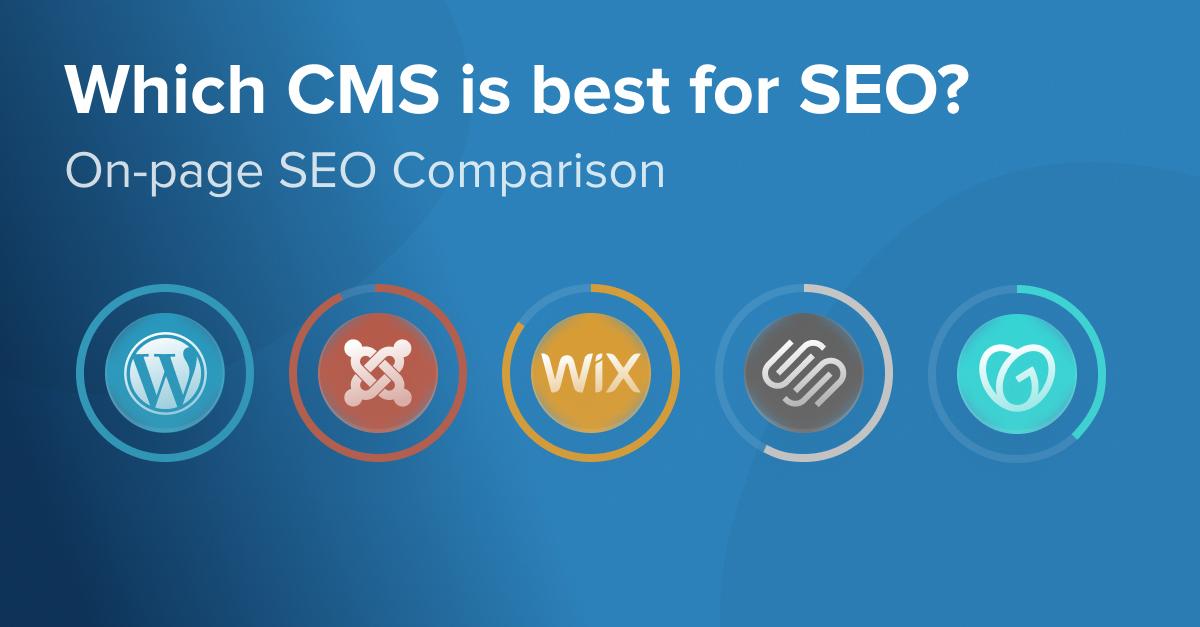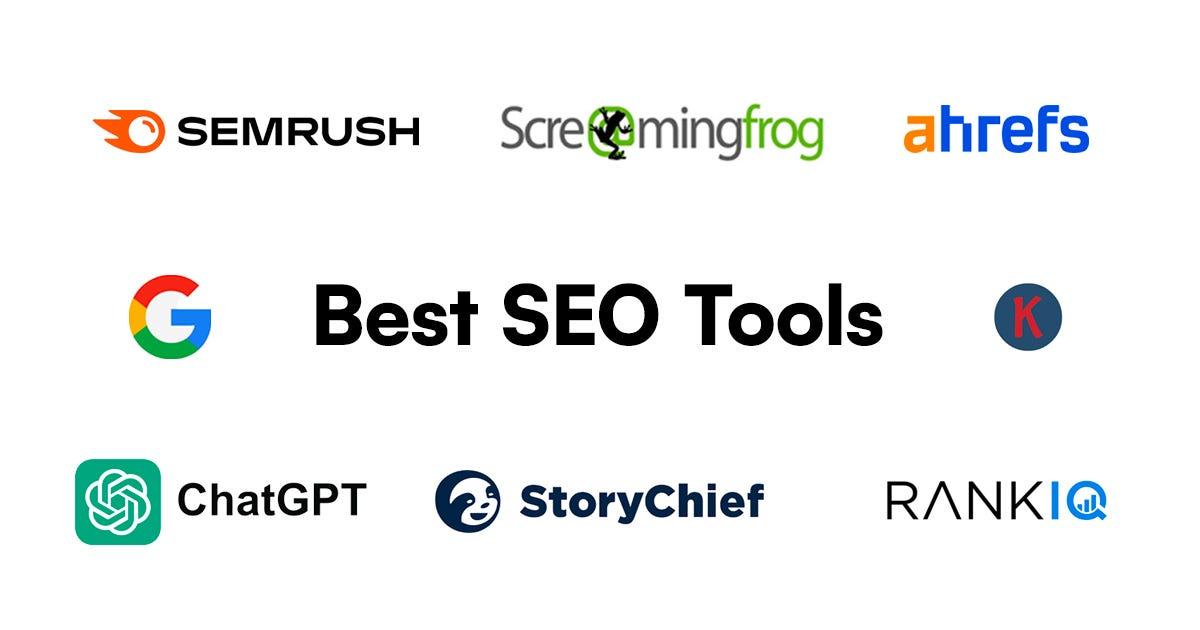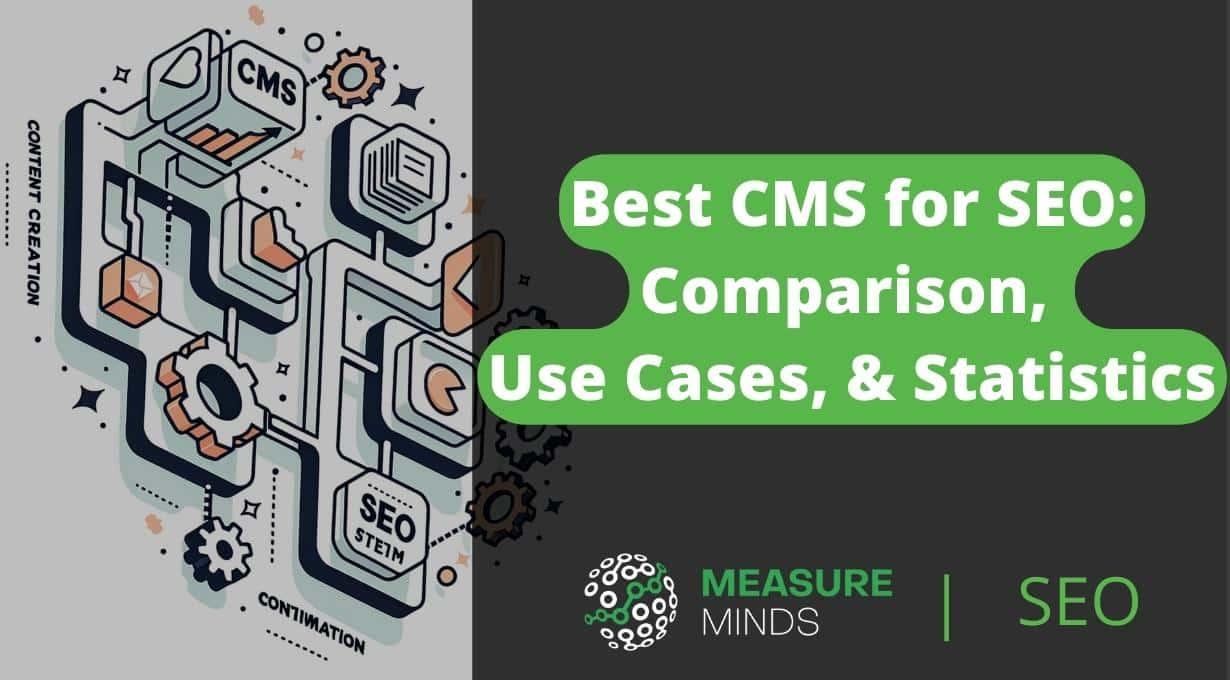Are you ready to boost your website’s visibility in 2024? Choosing the right Content Management System (CMS) can make all the difference for your SEO efforts. Join us as we compare the top 9 platforms that not only simplify your content creation but also enhance your search engine rankings!
Best CMS for SEO – Top 10 Platforms Compared
In today’s digital landscape, having a strong online presence is no longer just an option – it’s a necessity. Whether you’re a small business owner, a blogger, or part of a large organization, the right content management system (CMS) can make all the difference in how you reach your audience and climb the search engine rankings. But with so many platforms available, how do you choose the one that will best support your SEO efforts?
Welcome to our comprehensive guide on the Best CMS for SEO in 2024! In this article, we’ll dive into the top nine platforms, comparing their features, user-friendliness, and SEO capabilities. From robust customization options to built-in optimization tools, we’ll help you find the perfect CMS that not only meets your needs but also propels your content to new heights. Ready to supercharge your website’s visibility? Let’s explore the contenders and discover which platform deserves a spot in your digital toolkit!
Understanding the Importance of SEO in Your CMS Choice
When selecting a Content Management System (CMS), it’s crucial to consider how it impacts your search engine optimization (SEO) efforts. The right CMS can significantly enhance your visibility on search engines, driving more organic traffic to your site. Here’s why SEO should be at the forefront of your CMS decision-making process.
A well-optimized CMS provides essential features that can streamline your SEO strategies. These include:
- User-Friendly URL Structures: Clean and customizable URLs are vital for both search engines and users.
- Integrated SEO Tools: Many modern CMS platforms come with built-in tools or plugins that simplify keyword optimization, meta tags, and alt attributes management.
- Mobile Responsiveness: With Google prioritizing mobile-first indexing, a CMS that ensures responsive design is non-negotiable.
- Fast Loading Speeds: A CMS that allows for quick loading times is essential as it affects both user experience and search rankings.
Furthermore, your chosen CMS should facilitate the creation of high-quality content. Features that support easy formatting, multimedia integration, and content scheduling can enhance your ability to produce engaging material that resonates with your audience. Remember, search engines favor sites that regularly update their content with fresh and relevant information.
Another critical aspect is the ability to implement structured data. This schema markup helps search engines understand your content better, which can lead to rich snippets in search results, improving click-through rates. A CMS that supports easy integration of structured data can give you a competitive edge.
| Feature | Importance for SEO |
|---|---|
| User-Friendly URL Structure | Improves search engine crawling and user experience. |
| SEO Plugins | Facilitates optimization tasks and enhances content discoverability. |
| Mobile Responsiveness | Essential for rankings due to mobile-first indexing. |
| Site Speed Optimization | Directly affects user experience and search rankings. |
your CMS choice should align with your SEO goals. As you evaluate various platforms, prioritize those that offer robust SEO capabilities and a user-friendly experience. This combination will not only help you climb the search engine rankings but also engage your audience effectively.

Why the Right CMS Can Make or Break Your SEO Strategy
Choosing the right Content Management System (CMS) is pivotal for your SEO strategy. A well-optimized CMS not only makes it easier to create and manage content but also enhances your site’s visibility on search engines. If the platform you choose lacks essential SEO features, it could hinder your efforts to rank higher, leading to lost traffic and revenue.
Here are some key features to consider when evaluating a CMS for SEO effectiveness:
- SEO-Friendly URL Structures: A good CMS allows you to create clean, keyword-rich URLs that are easily crawlable by search engines.
- Built-in SEO Tools: Look for platforms that provide tools or plugins for on-page optimization, like meta tags, alt text, and social sharing options.
- Mobile Responsiveness: With mobile-first indexing, it’s crucial that your CMS supports responsive design to ensure your site looks great on all devices.
- Fast Loading Speeds: Page speed is a ranking factor, so choose a CMS that optimizes your site’s load time.
- Customizable Metadata: Your CMS should allow editing of title tags, meta descriptions, and header tags to enhance your site’s search presence.
Another critical aspect is how easily your CMS integrates with third-party SEO tools. Many platforms allow seamless integration with analytics and SEO software, enabling you to track performance, conduct keyword research, and analyze your competition. This data-driven approach is vital in refining your SEO strategies over time.
Moreover, consider the scalability of your CMS. As your website grows, your SEO needs will evolve. A platform that can accommodate additional features, plugins, or customizations will ensure your SEO strategy remains effective in the long run. The last thing you want is to outgrow your CMS and face the daunting task of migration.
Lastly, community support and documentation play a significant role in leveraging your CMS for SEO. A strong community can provide resources, tips, and troubleshooting assistance, while comprehensive documentation ensures you can fully utilize the platform’s capabilities. When you have the necessary support, you can confidently implement SEO changes, knowing you’re making informed decisions.

Key SEO Features to Look for in a CMS
When selecting a Content Management System (CMS) for your website, having robust SEO features is non-negotiable. The right CMS not only streamlines your content creation process but also enhances your visibility on search engines. Here are the essential features to look for:
- SEO-Friendly URLs: Ensure the CMS allows you to create clean, descriptive URLs. A good CMS will enable you to customize permalinks to make them more readable and relevant to your content.
- Meta Tags Management: Look for a platform that provides easy options for adding titles, descriptions, and keywords. These elements are crucial for optimizing your pages and improving click-through rates.
- Responsive Design Options: With mobile searches increasing, your CMS should offer templates that are mobile-friendly. Google prioritizes mobile-optimized sites in search rankings, making this feature vital.
- Built-in Analytics: A CMS with integrated analytics tools helps you track your SEO performance and understand visitor behavior. This insight allows you to make data-driven decisions to enhance your strategy.
- Social Media Integration: Your chosen platform should facilitate easy sharing of content across social media channels. This not only drives traffic but also improves your search engine ranking through increased engagement.
- XML Sitemap Generation: An automated XML sitemap feature is essential. It makes it easier for search engines to index your pages, improving your site’s visibility and rankings.
- Schema Markup Support: The ability to add schema markup can greatly enhance your SEO efforts. This feature helps search engines understand your content better, potentially leading to rich snippets in search results.
To illustrate how various CMS platforms stack up in terms of SEO features, consider the following comparison:
| CMS Platform | SEO-Friendly URLs | Meta Tags Management | Mobile Optimization | XML Sitemap |
|---|---|---|---|---|
| WordPress | ✅ | ✅ | ✅ | ✅ |
| Joomla | ✅ | ✅ | ✅ | ✅ |
| Drupal | ✅ | ✅ | ✅ | ✅ |
| Squarespace | ✅ | ✅ | ✅ | ✅ |
| Wix | 🔲 | ✅ | ✅ | 🔲 |
By prioritizing these key SEO features, you can ensure that your CMS will support your digital marketing efforts and help you achieve better search engine rankings. Don’t settle for a platform that lacks essential tools; choose one that empowers your SEO strategy and sets you up for success in 2024 and beyond.
Comparing Popular CMS Platforms for SEO Friendliness
When it comes to selecting a Content Management System (CMS) for your website, SEO friendliness is a crucial factor that can significantly impact your site’s visibility in search engine results. Each platform offers unique features tailored to enhance SEO performance, making it essential to understand how they stack up against each other. Here’s a breakdown of some of the most popular CMS platforms and what they bring to the table in terms of SEO capabilities.
WordPress is often hailed as the king of SEO-friendly CMS platforms. With its vast array of plugins like Yoast SEO and All in One SEO Pack, users can easily optimize their content for search engines. Additionally, WordPress boasts a simple permalink structure, responsive themes, and built-in blogging capabilities, all of which contribute to its SEO prowess.
Shopify caters primarily to e-commerce businesses but has made significant strides in SEO capabilities. It allows users to edit title tags and meta descriptions, offers SEO-friendly URLs, and provides a robust blogging platform. However, Shopify’s structure can be limiting for advanced SEO techniques, as users have less control over their website’s architecture compared to other platforms.
Squarespace is known for its visually appealing templates, and while it offers some SEO features, it lacks the flexibility found in WordPress. Squarespace automatically generates sitemaps and allows users to edit page titles and descriptions, but it can be restrictive for those looking to implement more advanced SEO strategies.
| CMS Platform | SEO Features | Ease of Use |
|---|---|---|
| WordPress | Plugins, permalinks, responsive themes | Very easy |
| Shopify | Title tags, meta descriptions, blog | Moderate |
| Squarespace | Auto sitemaps, page editing | Easy |
| Joomla | SEO extensions, URL management | Moderate to difficult |
Joomla offers a good balance between flexibility and functionality, with built-in features for SEO management such as customizable URLs and meta tags. However, its learning curve can be steep for beginners, making it less accessible for those who are new to web development.
Wix has improved significantly in terms of SEO, allowing users to customize alt tags, title tags, and generate sitemaps. While it may not offer the extensive features seen in WordPress, it remains a user-friendly option for small businesses and personal websites looking to enhance their online presence without a steep learning curve.
Ultimately, the best CMS for SEO will depend on your specific needs, technical expertise, and business goals. By weighing the pros and cons of each platform, you can make an informed decision that aligns with your SEO strategy and helps propel your website to the top of search engine rankings.
WordPress: The Unrivaled Leader in SEO Capabilities
When it comes to SEO capabilities, WordPress stands out as the premier choice for businesses and bloggers alike. With its robust architecture and user-friendly design, it offers a plethora of features that can significantly enhance your website’s visibility on search engines. Here’s why WordPress is the go-to platform for SEO enthusiasts:
- SEO-Friendly Structure: WordPress is built on a framework that search engines love. Its clean permalink structure allows for easy indexing of pages, ensuring that your content gets the attention it deserves.
- Customizable Meta Tags: With plugins like Yoast SEO and All in One SEO Pack, users can effortlessly customize meta titles, descriptions, and keywords, which are crucial for ranking higher in search results.
- Mobile Optimization: In an era where mobile traffic is paramount, WordPress themes are designed to be responsive. This means your site performs seamlessly across all devices, an essential factor for search engine rankings.
Moreover, the platform supports various multimedia formats, which enhances engagement. Search engines prioritize content that keeps users on the page longer, and WordPress makes it easy to incorporate images, videos, and infographics. This not only enriches the user experience but also improves your SEO performance.
| Feature | WordPress | Others |
|---|---|---|
| SEO Plugins | Yes, diverse options | Limited |
| Mobile-Friendly | Responsive themes | Varies |
| Ease of Use | User-friendly | Complex interfaces |
WordPress also excels in speed optimization, a crucial element for SEO. With various caching plugins and optimization tools, users can enhance page load times, which is a significant ranking factor. Fast-loading sites not only improve user experience but also reduce bounce rates, keeping visitors engaged longer.
In addition, the vibrant WordPress community is a treasure trove of resources for SEO. Countless tutorials, forums, and expert blogs provide valuable insights and tips to keep your SEO strategies sharp. You’re never alone on your journey to mastering SEO with WordPress; help is always just a few clicks away.
whether you’re a small business, a growing blog, or an enterprise-level website, WordPress delivers unmatched SEO capabilities that can propel your online presence. By choosing this platform, you’re not just opting for a CMS; you are selecting a powerful ally in the competitive digital marketing landscape.

Shopify: A Strong Contender for E-commerce SEO
When it comes to e-commerce platforms, Shopify has positioned itself as a formidable player in the realm of SEO. With a user-friendly interface and a plethora of built-in features, it enables online retailers to optimize their sites effectively. Shopify’s architecture is designed with SEO in mind, making it easier for businesses to climb search engine rankings.
One standout feature of Shopify is its clean URL structure. This allows search engines to easily crawl and index your pages, significantly impacting your visibility. Each product page can have its own unique URL, which is important for targeted keyword optimization. Additionally, Shopify automatically generates sitemap.xml files, ensuring that search engines can find all your content without any hassle.
Shopify also excels in offering customizable meta tags. Users can easily edit title tags and meta descriptions for their products and collections, which are crucial for click-through rates. The ability to integrate social media metadata is another advantage, allowing for better sharing and visibility on platforms like Facebook and Twitter.
Furthermore, Shopify provides a range of SEO apps available in its App Store. These tools can help streamline your optimization efforts, from improving site speed to enhancing image alt tags. Some popular SEO apps include:
- Plug in SEO
- SEO Manager
- Smart SEO
Site speed is a vital factor for SEO, and Shopify does a commendable job here. The platform is optimized for fast loading times, which not only enhances the user experience but also supports better rankings on search engines. It’s worth noting that having a mobile-responsive design is a given with Shopify templates, further ensuring that your site meets Google’s mobile-first indexing criteria.
In terms of analytics, Shopify offers robust reporting features that allow users to track their SEO performance. This data can guide strategic decisions and show what works and what doesn’t, making it easier for e-commerce businesses to refine their SEO strategies over time.
| Feature | Benefit |
|---|---|
| Clean URL Structure | Improves crawlability and indexing |
| Customizable Meta Tags | Enhances click-through rates |
| SEO Apps | Streamlines optimization efforts |
| Fast Loading Times | Supports better search rankings |
Shopify’s combination of usability and powerful SEO features makes it a strong contender for businesses looking to thrive in the competitive e-commerce landscape. Whether you are a small startup or an established retailer, harnessing the SEO capabilities of Shopify can lead to increased visibility and sales.

Wix: Is It Really Good for SEO in 2024?
When it comes to creating a website that ranks well in search engines, many people wonder if Wix is up to the task. In 2024, Wix has made significant strides in enhancing its SEO capabilities, making it a strong contender among CMS options. Let’s dive into what makes Wix a viable choice for SEO and what limitations you might encounter.
One of the standout features of Wix is its user-friendly interface. This platform allows even the most novice users to optimize their sites effectively. With integrated SEO tools, you can easily manage:
- Meta Tags: With simple fields to input your title and description, customizing your site’s appearance in search results is straightforward.
- URL Structure: Wix provides options for creating clean, keyword-rich URLs, which are essential for SEO.
- Image Alt Text: Easily add descriptive alt text to your images, helping search engines understand your content better and improving accessibility.
Additionally, Wix has improved its site loading speeds and mobile optimization, crucial factors for SEO ranking. Google prioritizes fast-loading, mobile-friendly websites, and Wix’s templates are designed to be responsive. By choosing a well-optimized template and minimizing heavy elements, you can enhance your site’s performance remarkably.
| Feature | Wix | Other CMS |
|---|---|---|
| Ease of Use | Very High | Varies |
| Customization Options | Moderate | High |
| Mobile Optimization | Yes | Yes |
| Loading Speed | Improved | Varies |
However, it’s essential to consider some limitations. While Wix offers good foundational SEO tools, it lacks the advanced features that some other platforms provide. For instance:
- Limited Customization: Advanced users may find the customization options somewhat restrictive compared to open-source platforms like WordPress.
- Redirect Management: Managing redirects can be less intuitive in Wix, which might pose challenges for sites that require extensive migration or restructuring.
Wix has definitely improved its SEO game in 2024. It’s an excellent choice for small to medium-sized businesses or individuals looking for an easy way to create and manage a website. While it may not compete with more robust platforms in every aspect, for many users, its advantages far outweigh the disadvantages. So, if you’re considering launching a new site, Wix might just be the user-friendly solution you need to climb the SEO ladder.
Squarespace: Balancing Design and SEO Effectiveness
When it comes to building a website that captivates audiences while also performing well in search engines, Squarespace stands out as a notable contender. Its blend of aesthetic appeal and functional design creates a platform that caters to both creatives and business owners. However, there are some nuances to consider when it comes to optimizing Squarespace for SEO.
Design Flexibility: Squarespace is renowned for its visually stunning templates that allow users to create professional-looking websites in a matter of minutes. The drag-and-drop interface makes it easy to customize layouts, images, and typography to match your brand identity. However, it’s essential to remember that while design is crucial, it shouldn’t overshadow the importance of SEO best practices.
Built-In SEO Features: One of the significant advantages of using Squarespace is that it comes equipped with several built-in SEO tools. These features include:
- Automatic XML Sitemap Generation – This helps search engines index your site more efficiently.
- Customizable Page Titles – You can easily set unique titles and descriptions for each page, enhancing its visibility.
- SSL Certificates – Ensuring your site is secure, which is a ranking factor for Google.
Despite these advantages, some users may find that Squarespace has limitations in specific areas compared to other CMS platforms. For instance, according to various SEO specialists, while you can optimize your meta descriptions, the character limits can sometimes be restrictive, affecting how your search snippets appear in search results.
Content Management: Content is king when it comes to SEO, and Squarespace supports content creation through blogging features and integrated social media sharing. Regularly updated, high-quality content not only engages your audience but also signals to search engines that your website is active and relevant. However, it’s vital to have a strategy that includes keyword research and content planning for optimal results.
Mobile Optimization: With a significant amount of web traffic coming from mobile devices, Squarespace’s responsive design ensures that your website looks great on any screen size. This is a critical factor for SEO, as Google favors mobile-friendly sites. When using Squarespace, always preview your design across devices to ensure an optimal user experience.
Squarespace effectively balances design and SEO, making it a solid choice for those looking to create visually stunning websites without sacrificing search engine performance. By leveraging its built-in features while also being mindful of content strategy and mobile optimization, you can create a site that not only looks good but ranks well too.

Joomla: The Hidden Gem for SEO Savvy Users
If you’re on the hunt for a content management system that packs a punch for search engine optimization, look no further than Joomla. Often overshadowed by more popular platforms, Joomla offers powerful features that can significantly enhance your site’s visibility.
Why Choose Joomla for SEO? One of the standout features of Joomla is its built-in SEO tools. With a user-friendly interface, it allows you to easily manage metadata, optimize URLs, and utilize tags effectively. Here are some of the key advantages:
- SEO-Friendly URLs: Joomla enables you to create clean, descriptive URLs that make it easier for search engines to index your content.
- Rich Snippets Support: The platform supports structured data, which can enhance your search results with rich snippets, improving click-through rates.
- Advanced Caching: Joomla’s caching system boosts page load speeds, a crucial factor in SEO rankings.
Moreover, the flexibility of Joomla’s content management allows for easy integration of third-party SEO tools. A range of extensions is available that can enhance your SEO capabilities even further. Popular options include:
- sh404SEF: A comprehensive tool for URL rewriting, metadata management, and more.
- Easy Frontend SEO: This extension simplifies on-page SEO with real-time editing capabilities.
- OSMeta: Streamlines metadata management to ensure every page is optimized for search engines.
Responsive Design & Mobile Optimization: In today’s mobile-centric world, having a responsive site is non-negotiable. Joomla templates are designed to be responsive, ensuring users have a seamless experience, regardless of the device. This not only improves user experience but also plays a role in search engine ranking algorithms.
Lastly, let’s touch on community support. Joomla has a diverse community of developers who are constantly updating the platform and its SEO capabilities. Accessing tutorials, forums, and expert advice can be a game changer in optimizing your site. In essence, Joomla is a platform that gives SEO-savvy users the tools they need to succeed, making it a hidden gem worth considering for your next project.

Drupal: Advanced SEO Features for Tech-Savvy Marketers
Why Tech-Savvy Marketers Love Drupal for SEO
Drupal is not just another content management system; it’s a powerhouse for those who understand the nitty-gritty of SEO. While many platforms offer basic SEO tools, Drupal goes above and beyond, equipping tech-savvy marketers with the advanced features they crave. Here’s what makes Drupal stand out:
- Customizable URL Structures: With Drupal, you can easily set up clean, keyword-rich URLs that not only improve readability but also enhance search engine visibility.
- In-depth Metadata Management: Drupal allows you to manage metadata at both the content type and individual node levels, ensuring that every piece of content is optimized for search engines.
- Robust Taxonomy System: The taxonomy feature enables you to organize content effectively, making it easier for search engines to index your pages and for users to navigate your site.
- Built-in Redirects: Easily set up 301 redirects to maintain link equity and improve user experience when content changes or is deleted.
- SEO-Friendly Themes: Drupal themes are designed with SEO in mind, allowing for fast load times and mobile-friendly designs that search engines favor.
Enhanced Performance and Security
It’s no secret that site speed and security are crucial factors in SEO rankings. Drupal excels in both areas. With caching systems that can be easily configured, your site can load faster, reducing bounce rates and enhancing user experience. Additionally, Drupal’s robust security features help protect your site from vulnerabilities, ensuring that search engines view your site as a safe and reliable source.
Integration with SEO Tools
Another advantage of using Drupal is its seamless integration with various SEO tools and modules. Whether it’s Google Analytics, Yoast SEO, or other analytics platforms, integrating these tools enhances your ability to track performance and make data-driven decisions. This level of insight allows you to refine your strategies and improve your site’s visibility over time.
| Feature | Drupal | Other CMS |
|---|---|---|
| Custom URL Structure | Yes | Limited |
| Metadata Management | Advanced | Basic |
| Redirect Management | Built-in | Plugin Required |
| SEO Tools Integration | Seamless | Variable |
In a world where SEO is constantly evolving, the ability to adapt is crucial. Drupal’s flexibility allows you to implement the latest trends and techniques in SEO, making it a favorite among tech-savvy marketers. From enhancing content visibility to improving user experience, Drupal is equipped with features that not only meet but exceed the expectations of modern marketers.

Ghost: A Minimalist Approach to SEO Optimization
When it comes to SEO optimization, a minimalist approach can be incredibly effective. Ghost CMS stands out as an ideal platform for users looking to streamline their SEO efforts without unnecessary complexities. With its clean design and focus on content, Ghost allows for an efficient workflow that prioritizes what really matters: your audience’s experience and your site’s visibility.
One of the key advantages of using Ghost for SEO is its built-in features that cater specifically to search engine requirements. Here are some notable aspects:
- Fast Loading Speeds: Ghost is built on Node.js, which ensures quick loading times that contribute positively to SEO rankings.
- Mobile Optimization: With the increasing use of mobile devices for browsing, Ghost’s responsive themes guarantee a seamless experience across all platforms.
- Structured Data: Ghost supports schema markup natively, enhancing your content’s visibility in search results.
Another benefit is the intuitive content editor, which empowers users to create rich, engaging content without the clutter often found in other CMS environments. This minimalist design not only enhances productivity but also aligns with SEO best practices by encouraging the production of high-quality, relevant content that resonates with your audience.
To further illustrate the advantages, consider the following comparison of key SEO features across popular CMS platforms:
| CMS Platform | Loading Speed | Mobile-Friendly | Structured Data Support |
|---|---|---|---|
| Ghost | Fast | Yes | Yes |
| WordPress | Moderate | Yes | Via Plugins |
| Wix | Moderate | Yes | No |
adopting a minimalist approach with Ghost CMS can yield significant SEO benefits. By focusing on essential features and eliminating unnecessary distractions, you can enhance your online presence while providing a superior user experience. If you’re seeking a CMS that aligns with modern SEO practices while maintaining simplicity, Ghost is undoubtedly a top contender in 2024.

CMS Performance: Page Speed and User Experience for SEO
When it comes to optimizing your website for search engines, the performance of your Content Management System (CMS) plays a crucial role. Page speed is not just a ranking factor; it directly influences user experience. A slow-loading website can frustrate visitors, leading to higher bounce rates and lower conversion rates. Thus, choosing a CMS that prioritizes speed is essential for SEO success in 2024.
Many popular CMS platforms offer built-in features and plugins to enhance performance, but not all are created equal. Here are some key elements to consider when evaluating the speed capabilities of a CMS:
- Hosting Options: The performance of your website can greatly depend on the hosting provider associated with your CMS. Look for platforms that offer reliable and fast hosting solutions.
- Code Efficiency: A CMS that generates clean and minimal code will generally load faster. Complex or bloated code can slow down your site, hindering your SEO efforts.
- Image Optimization: Check if the CMS provides tools for automatic image compression and optimization, as large images can significantly affect loading times.
- Cache Management: A good CMS should include caching solutions to serve cached versions of your pages, reducing the time it takes for users to see your content.
User experience (UX) is another critical factor linked to SEO. Search engines prioritize websites that not only load quickly but also provide a seamless browsing experience. A CMS that allows for easy navigation, mobile responsiveness, and intuitive design can help keep your visitors engaged. Here are some aspects where UX intersects with SEO:
- Mobile-Friendliness: With more users accessing websites from mobile devices, a responsive design is vital. Ensure your CMS facilitates this for optimal user engagement.
- Clear Navigation: A well-structured menu and internal linking strategy can guide users through your site effortlessly, contributing to lower bounce rates.
- Accessibility: A CMS that supports accessibility standards ensures that all visitors, including those with disabilities, can access and enjoy your content.
the right CMS can be a game-changer for both page speed and user experience. Look for platforms that boast efficient performance metrics and user-friendly design capabilities. To illustrate how various CMS options stack up against each other in terms of page speed and UX, here’s a quick comparison:
| CMS | Page Speed (Average Load Time) | User Experience Score |
|---|---|---|
| WordPress | 2.5 seconds | 9/10 |
| Joomla | 3.0 seconds | 8/10 |
| Drupal | 2.8 seconds | 7/10 |
| Shopify | 1.7 seconds | 9/10 |
Ultimately, as you evaluate the best CMS for your SEO needs, consider how each platform aligns with your goals for page speed and user experience. Making the right choice can lead to not just better rankings, but also happier visitors who are more likely to convert into loyal customers.

Integrating SEO Tools and Plugins with Your CMS
When it comes to boosting your website’s visibility, is a game changer. The right tools can seamlessly enhance your site’s performance, making it easier for search engines to crawl and index your content. Let’s explore how these integrations can elevate your SEO strategy and ultimately contribute to your site’s success.
Many popular content management systems (CMS) come equipped with a variety of SEO plugins that cater to different needs. Some of the essential features to look for include:
- Keyword Optimization: Tools that help you find and utilize the right keywords within your content.
- XML Sitemap Generation: Automatically generates sitemaps to help search engines discover your pages.
- Meta Tag Management: Easily manage title tags, meta descriptions, and alt text for images.
- Content Analysis: Provides real-time feedback on content readability and SEO best practices.
For instance, platforms like WordPress offer plugins such as Yoast SEO and All in One SEO Pack that simplify these processes. With user-friendly interfaces, these tools allow even non-technical users to optimize their sites effectively. Imagine typing in your keyword and instantly receiving suggestions on how to enhance your content!
Many CMS platforms have built-in support for third-party SEO tools, which can save you time and effort. Here’s a quick comparison of how some leading CMS options support SEO integration:
| CMS | SEO Plugins Available | Ease of Use |
|---|---|---|
| WordPress | Yoast SEO, Rank Math | ★★★★☆ |
| Joomla | sh404SEF, Easy Frontend SEO | ★★★☆☆ |
| Drupal | Pathauto, Metatag | ★★★☆☆ |
| Shopify | SEO Manager, Plug in SEO | ★★★★☆ |
Incorporating these tools not only boosts your SEO capabilities but also offers valuable insights into your site’s performance. Many plugins provide analytics to track keyword rankings, traffic, and user engagement, allowing you to refine your strategy continually. Plus, the regular updates and support from these tools ensure you stay ahead of the latest SEO trends.
Ultimately, the integration of SEO tools and plugins is essential for any CMS aiming for online success. Not only do they simplify the optimization process, but they also empower you with the information needed to make informed decisions about your content and marketing strategies. So, whether you’re a blogger, an e-commerce store owner, or a corporate website manager, leveraging these tools is key to enhancing your online presence in 2024.

Final Thoughts on Choosing the Best CMS for Your SEO Needs
When selecting a CMS that aligns with your SEO goals, it’s crucial to consider several key factors that can make or break your online presence. First and foremost, the CMS should offer robust SEO features that allow you to optimize your content effortlessly. Look for platforms that provide built-in tools for creating SEO-friendly URLs, managing metadata, and generating XML sitemaps. These features not only save you time but also help to improve your site’s visibility in search engine results.
Another important aspect to keep in mind is the flexibility of the CMS in terms of customization. You want a platform that allows you to easily adapt your site’s structure and content to better fit evolving SEO best practices. A CMS that supports various themes and plugins can significantly enhance your ability to implement SEO strategies effectively. For instance, platforms like WordPress have a rich ecosystem of plugins designed specifically for SEO, making it easier to enhance your site’s performance.
Don’t overlook the importance of mobile optimization. With the increasing number of users accessing the web via mobile devices, a responsive design is essential. A CMS that prioritizes mobile-friendliness not only improves user experience but also plays a critical role in SEO rankings. Make sure the platform you choose offers responsive design choices and tools to test mobile performance.
Moreover, consider the community and support available for the CMS. A platform with a strong support network means you can find solutions to SEO challenges more easily. Look for active forums, comprehensive documentation, and tutorials that can guide you through various SEO tasks. When you encounter issues or need to implement new strategies, having access to expert advice can be invaluable.
take the time to analyze the CMS’s performance metrics. A good CMS should enable you to track your SEO efforts through analytics tools. Look for platforms that integrate seamlessly with Google Analytics and other tracking tools. This will allow you to measure your success and make data-driven decisions to refine your SEO strategies over time.
the best CMS for your SEO needs will depend on your specific goals, technical expertise, and the nature of your content. By weighing these factors and considering how each platform aligns with your objectives, you can make an informed decision that propels your online presence forward.
Frequently Asked Questions (FAQ)
Q&A: Best CMS for SEO 2024 – Top 9 Platforms Compared
Q1: Why is choosing the right CMS important for SEO?
A1: Great question! Choosing the right Content Management System (CMS) can significantly impact your site’s search engine performance. A well-optimized CMS makes it easier to implement SEO best practices, such as optimizing meta tags, creating clean URLs, and ensuring mobile-friendliness. In 2024, where search engines are becoming increasingly sophisticated, having a CMS that supports SEO can give you a competitive edge.
Q2: What are some key features to look for in an SEO-friendly CMS?
A2: When searching for an SEO-friendly CMS, you want to look for features like customizable permalinks, built-in SEO tools (like sitemaps and schema markup), mobile responsiveness, fast loading times, and the ability to integrate with popular SEO plugins. These elements help you create a more search-engine-friendly website that’s easier for users to navigate.
Q3: Which CMS platforms stand out as the best for SEO in 2024?
A3: In 2024, we’ve compared nine top platforms, including WordPress, Wix, Joomla, Drupal, Shopify, Squarespace, Ghost, HubSpot, and Magento. Each has its own strengths, but WordPress often leads the pack due to its flexible SEO plugins and large community support. However, depending on your specific needs—like e-commerce or blogging—you might find that other platforms suit you better.
Q4: Is WordPress really the best option for SEO?
A4: For many, yes! WordPress offers a user-friendly interface and a plethora of SEO plugins, such as Yoast SEO and All in One SEO. These tools simplify the optimization process, allowing you to focus on creating quality content. Plus, because it’s open-source, there are endless customization options to tailor it to your SEO strategy.
Q5: What about website speed? How do different CMS options compare?
A5: Website speed is crucial for SEO, as both users and search engines favor fast-loading sites. Generally, platforms like Shopify and Magento are optimized for speed, especially for e-commerce sites. However, with the right hosting and optimization tools, WordPress can also compete. Always consider how easy it is to enhance loading times with your chosen CMS.
Q6: Are there any CMS platforms specifically designed for e-commerce that are good for SEO?
A6: Absolutely! Shopify and Magento are two of the best e-commerce platforms that excel in SEO capabilities. Shopify is known for its user-friendly interface and built-in SEO features, making it easy for online stores to rank well. Magento, while more complex, offers robust SEO tools for larger e-commerce sites that need more customization.
Q7: What’s the importance of mobile optimization in SEO, and which CMS platforms do this best?
A7: Mobile optimization is critical as more users access websites via mobile devices. Google also prioritizes mobile-first indexing, meaning it evaluates the mobile version of your site for ranking. All platforms on our list generally offer mobile-responsive themes. However, Wix and Squarespace are particularly praised for their seamless mobile design capabilities.
Q8: Can I switch my CMS later if I start with one that isn’t SEO-friendly?
A8: Yes, you can switch your CMS, but it can be a complex process. Moving your content and ensuring that SEO elements like redirects are correctly set up can take time and effort. It’s best to choose a CMS that meets your current and future needs right from the start to avoid this hassle down the line.
Q9: How do I decide which CMS is the best fit for my business?
A9: Start by assessing your specific needs—consider your technical skills, the type of content you’ll be creating, and any e-commerce requirements. Then, look for a CMS that aligns with those needs while also being SEO-friendly. It might also be helpful to test a few platforms using free trials or demos to see which one feels intuitive and meets your expectations.
Q10: What’s one piece of advice you’d give for optimizing SEO on any CMS?
A10: Focus on creating high-quality, relevant content that resonates with your audience. No matter which CMS you choose, valuable content is the cornerstone of SEO success. Combine that with the right technical optimizations, and you’ll be well on your way to improving your site’s ranking in 2024 and beyond!
In Conclusion
As we wrap up our deep dive into the best CMS platforms for SEO in 2024, it’s clear that choosing the right content management system can make all the difference in your online visibility. Whether you’re a seasoned marketer or just starting out, the platforms we’ve compared each offer unique features that cater to different needs and goals.
Remember, the best CMS for you will depend on your specific requirements—like ease of use, customization options, or built-in SEO tools. So, take the time to evaluate what matters most for your business and audience.
Don’t forget that SEO is an ongoing journey, and your choice of CMS is just the first step. As you embark on this exciting path, make sure to stay informed and adapt to the ever-evolving digital landscape.
So, which platform caught your eye? Are you ready to take your SEO game to the next level with a new CMS? Dive in, test them out, and watch as your online presence grows. Your future self will thank you! Happy optimizing!



